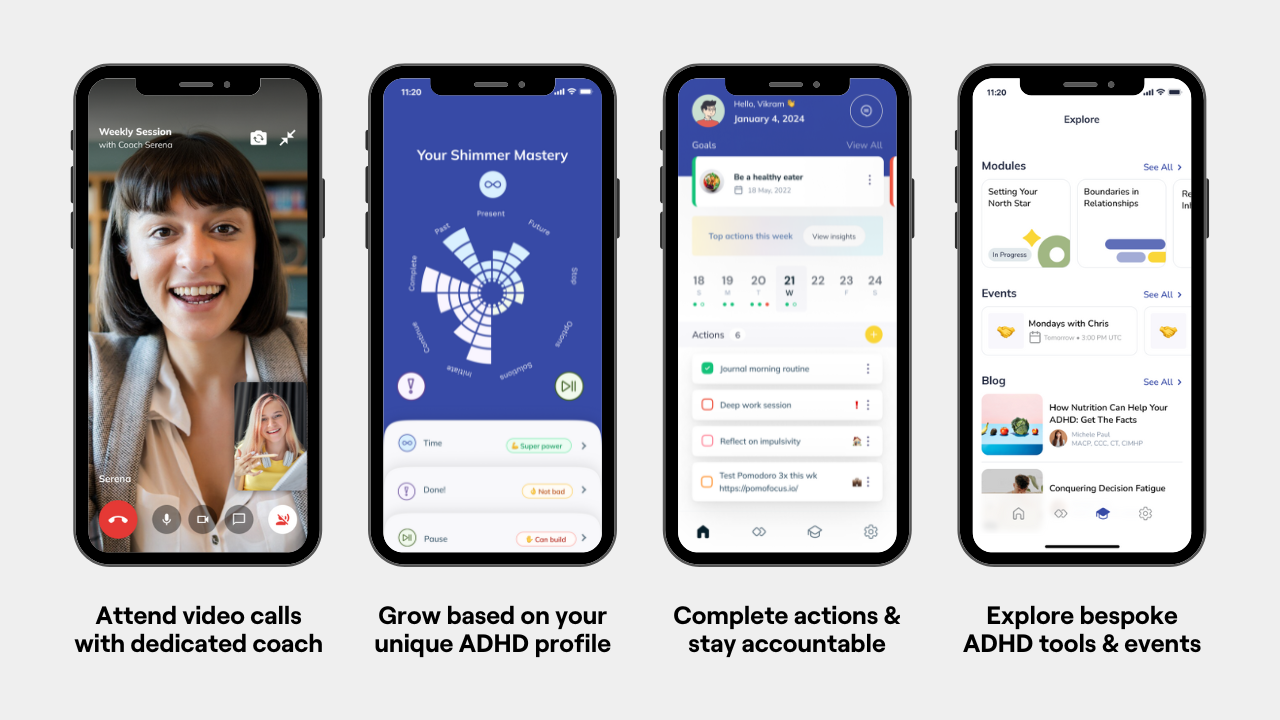
Y Combinator alum Shimmer, which offers a coaching platform for adults, has raised $2.2 million in a seed funding round led by Worklife Ventures and Seed to B. The platform aims to help adults with ADHD tackle challenges via personalized 1:1 video coaching, productivity tools and science-backed learning modules. Shimmer matches users to an ADHD coach who helps them meet goals, maintain a positive approach to change and improve productivity,
The startup was founded in 2021 by CEO Christal Wang, a neurodiverse entrepreneur who dropped out of Berkeley-Haas’ MBA/MPH program to start Shimmer, and CTO Vikram Sreedhar, a Stanford graduate who previously founded a non-profit called Make A Difference (M.A.D.)
Wang told TechCrunch that when she was diagnosed with ADHD, she finally had an explanation for her behavior after decades of being told she was “too much.” After her diagnoses, her physiatrist gave her a prescription for Adderall.
“As someone who was raised in Asian culture where medication is usually not the first line of defense, and sometimes even frowned upon, I naturally began hunting for behavioral solutions,” Wang said. “When I found ADHD coaching as a concept, it seemed too good to be true. It was proven to be effective, the top experts in the space recommended it as a part of mixed treatment, and I strongly resonated with its premise. Yet, it really was too good to be true. It was extremely expensive.”
Wang says the ADHD coaching options that she came across cost around $300 an hour and were hard to navigate, and that her psychiatrist couldn’t recommend a specific coach for her.
Wang and Sreedhar then set out to create an ADHD coaching platform that solved these issues. The duo wanted to offer users access to ADHD coaching sessions at a lower price point than what Wang came across when she was first looking for sessions for herself.
The most popular Shimmer package gives users 30-min coaching sessions per week for $230 per month. The platform also offers weekly 15-minute or 45-minute coaching sessions for $140 or $345 per month, respectively.

Image Credits: Shimmer
When users first sign up for Shimmer they are asked to answer a series of questions about their ADHD background, specific challenges and preferences they have for their coach. They are then matched with one of Shimmer’s 30+ ADHD coaches. Users then get access to a mix of video, text and visual resources and exercises. After completing the initial exercises, users meet with their coach. Then, each week users meet with their coach to move closer to their goals.
Throughout the week, users have to complete a series of actions, ranging from new meditation experiments to reworked morning routines.
Most of Shimmer’s users are between the ages of 20 and 50. Some of the most common struggles that people work through on the platform are time management, emotion resilience and regulation, self acceptance and self confidence, habit and routine formation, procrastination, motivation and general productivity.
Since its launch a little over a year ago in October 2022, Shimmer coaches have held over 15,000 coaching sessions. The platform is available on iOS, Android and the web.
As for the new funding, Shimmer plans to use it to work with provider, payor, and employer partners to reduce the out-of-pocket cost for members to access ADHD coaching. In addition, the startup will leverage AI to make coaches more efficient without sacrificing authenticity.
The startup’s seed funding included participation from Aglaé Ventures, Koa Labs, and Gaingels. The latest funding round brings Shimmer’s total funding to $3.5 million.
In terms of the future, Shimmer wants to facilitate all sorts of neuro-types in their personal development journey. Although Shimmer started out with ADHD services, the startup has already begun helping users with Autism. The company’s goal is to soon serve various intersecting communities with coaching and other personal development experiences and tools.
“From a technology standpoint, we’ll be continuing to invest in using technology to scale and improve the parts of personal development and coaching where real humans are better at, while automating tedious, repetitive tasks,” Wang said. “We see a near future where all neurodiverse folks are using Shimmer, seamlessly integrated into their lives, to reach their goals.”
Shimmer plans to continue to educate the broader community on how to create more inclusive spaces and support their neurodiverse colleagues and loved ones. The startup’s future roadmap includes corporate training, community support and more.